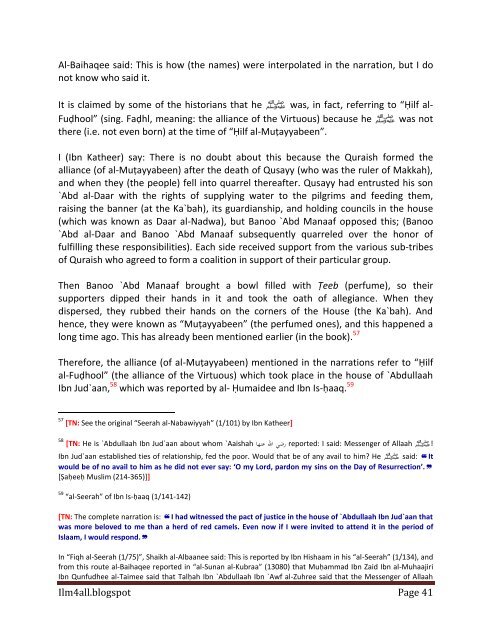You also want an ePaper? Increase the reach of your titles
YUMPU automatically turns print PDFs into web optimized ePapers that Google loves.
<strong>Al</strong>-Baihaqee said: This is how (the names) were interpolated in the narration, but I do<br />
not know who said it.<br />
It is claimed by some of the historians that he ﷺ was, in fact, referring to “Ḥilf al-<br />
Fuḍhool” (sing. Faḍhl, meaning: the alliance of the Virtuous) because he ﷺ was not<br />
there (i.e. not even born) at the time of “Ḥilf al-Muṭayyabeen”.<br />
I (Ibn Katheer) say: There is no doubt about this because the Quraish formed the<br />
alliance (of al-Muṭayyabeen) after the death of Qusayy (who was the ruler of Makkah),<br />
and when they (the people) fell into quarrel thereafter. Qusayy had entrusted his son<br />
`Abd al-Daar with the rights of supplying water to the pilgrims and feeding them,<br />
raising the banner (at the Ka`bah), its guardianship, and holding councils in the house<br />
(which was known as Daar al-Nadwa), but Banoo `Abd Manaaf opposed this; (Banoo<br />
`Abd al-Daar and Banoo `Abd Manaaf subsequently quarreled over the honor of<br />
fulfilling these responsibilities). Each side received support from the various sub-tribes<br />
of Quraish who agreed to form a coalition in support of their particular group.<br />
Then Banoo `Abd Manaaf brought a bowl filled with Ṭeeb (perfume), so their<br />
supporters dipped their hands in it and took the oath of allegiance. When they<br />
dispersed, they rubbed their hands on the corners of the House (the Ka`bah). And<br />
hence, they were known as “Muṭayyabeen” (the perfumed ones), and this happened a<br />
long time ago. This has already been mentioned earlier (in the book). 57<br />
Therefore, the alliance (of al-Muṭayyabeen) mentioned in the narrations refer to “Ḥilf<br />
al-Fuḍhool” (the alliance of the Virtuous) which took place in the house of `Abdullaah<br />
Ibn Jud`aan, 58 which was reported by al- Ḥumaidee and Ibn Is-ḥaaq. 59<br />
57 [TN: See the original “<strong>Seerah</strong> al-Nabawiyyah” (1/101) by Ibn Katheer]<br />
!ﷺ reported: I said: Messenger of <strong>Al</strong>laah رضيُاهللُعنها [TN: He is `Abdullaah Ibn Jud`aan about whom `Aaishah 58<br />
Ibn Jud`aan established ties of relationship, fed the poor. Would that be of any avail to him? He ﷺ said: ❝It<br />
would be of no avail to him as he did not ever say: ‘O my Lord, pardon my sins on the Day of Resurrection’.❞<br />
[Ṣaḥeeḥ Muslim (214-365)]]<br />
59 “al-<strong>Seerah</strong>” of Ibn Is-ḥaaq (1/141-142)<br />
[TN: The complete narration is: ❝I had witnessed the pact of justice in the house of `Abdullaah Ibn Jud`aan that<br />
was more beloved to me than a herd of red camels. Even now if I were invited to attend it in the period of<br />
Islaam, I would respond.❞<br />
In “Fiqh al-<strong>Seerah</strong> (1/75)”, Shaikh al-<strong>Al</strong>baanee said: This is reported by Ibn Hishaam in his “al-<strong>Seerah</strong>” (1/134), and<br />
from this route al-Baihaqee reported in “al-Sunan al-Kubraa” (13080) that Muḥammad Ibn Zaid Ibn al-Muhaajiri<br />
Ibn Qunfudhee al-Taimee said that Talḥah Ibn `Abdullaah Ibn `Awf al-Zuhree said that the Messenger of <strong>Al</strong>laah<br />
Ilm4all.blogspot Page 41


